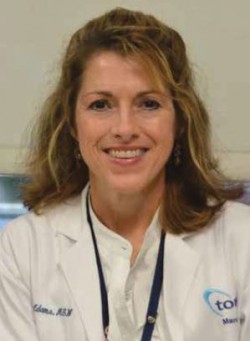Clear communication is key to coping with end-of-life issues. Stacey Adams, LCSW, pursued social work after a period of transformation that included the loss of several family members and a divorce. Adams, originally from Topsfield, Mass., enrolled at the Tulane University School of Social Work in the fall of 2003 with the goal of earning her master’s degree in social work. Her studies at Tulane included an internship with River Region Hospice. “I knew I wanted to do medical social work,” Adams says, citing a desire to help families remain intact and move positively through traumatic diagnoses and the pain of loss. “I didn’t realize that there are as many choices for end-of-life issues for the patient and family as there are at the beginning!”
Stacey Adams, LCSW, pursued social work after a period of transformation that included the loss of several family members and a divorce. Adams, originally from Topsfield, Mass., enrolled at the Tulane University School of Social Work in the fall of 2003 with the goal of earning her master’s degree in social work. Her studies at Tulane included an internship with River Region Hospice. “I knew I wanted to do medical social work,” Adams says, citing a desire to help families remain intact and move positively through traumatic diagnoses and the pain of loss. “I didn’t realize that there are as many choices for end-of-life issues for the patient and family as there are at the beginning!”
When Hurricane Katrina hit, Adams continued her master’s degree studies in Topsfield, eventually returning to New Orleans. She completed her internship at Touro Infirmary, where she has worked since 2006.
Along with seeing chronically ill patients, Adams works with end-of-life patients, including those in Touro’s oncology ward. In this role, “The challenge is assessing the patient and the family—where their hearts and heads are,” Adams says. “There are so many different variables: for instance, if a patient is ready and a family is not.”
Adams’ day-to-day routine involves visiting patients and getting “snapshots” of their lives before they arrived in the hospital. With end-of-life patients, her goal is twofold: to follow through on a patient’s wishes, and to help both patients and families understand the process of letting go. “It is one of our goals to get the family to come up with a plan,” she says. “We’re trying to walk the line between knowing what the patient truly wants, which is paramount, and where the family is at and what they can actually do to help.”
When a death goes badly or is unplanned for, Adams says, families can lose their center. “All those silences start—those closed lines of communication,” she says. She sees her role as helping bereaved families figure out how to move forward.
“To me, it’s nothing but spiritually fulfilling [and] emotionally fulfilling,” Adams says, reflecting on her work. “I’m dedicated to figuring out how to support families through this process.”
